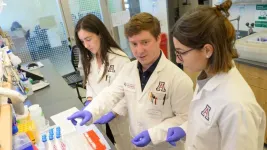(Press-News.org) A prestigious National Institute on Aging training grant to develop a future workforce of research scientists in the field of Alzheimer’s disease and related dementias was awarded to researchers at the Center for Innovation in Brain Science at the University of Arizona Health Sciences.
Roberta Diaz Brinton, PhD, Regents Professor and director of the Center for Innovation in Brain Science, is principal investigator on Translational Research in Alzheimer’s Disease and Related Dementias, or TRADD, a five-year, $1.4 million grant that supports an innovative problem-based learning experience. The predoctoral training program brings together students from diverse areas of study to address the need for highly trained, cross-disciplinary research scientists in Alzheimer’s disease research.
“Alzheimer’s is a highly complex disease,” said Brinton, who is a member of the university’s BIO5 Institute. “Through this training program, we will continue to train the next generation of Alzheimer’s researchers to address one of the world’s most intractable health challenges through innovative team science and patient-inspired approaches.”
The recent award is a five-year renewal of the center’s 2018 predoctoral National Institutes of Health TRADD training grant, which successfully trained 15 graduate students pursuing doctoral and dual medical and doctoral degrees.
Co-principal investigator Kathleen Rodgers, PhD, is a professor of pharmacology at the College of Medicine – Tucson and associate director of translational neurosciences for the Center for Innovation in Brain Science. She has recruited experts across each domain of translation to educate students in diverse areas including big data analytics, brain imaging, clinical trial design, Food and Drug Administration regulation, and biotech commercialization. Brinton leads “Consideration of Ethics and Leadership at the Rate of Change in the 21st century,” which is relevant to ethical considerations when conducting translational research and professional development.
The TRADD program is part of the Center for Innovation in Brain Science’s unique training model, which includes three National Institutes of Health-funded training programs that integrate undergraduate and graduate student and early-career faculty development. Collectively, the three NIH-funded training programs deliver a continuum of mentorship and experiential learning in team science, focused on Alzheimer’s and other neurodegenerative diseases.
Alzheimer’s disease is a devastating neurodegenerative disorder characterized by a gradual loss of memory and cognitive function. An estimated 6.5 million Americans aged 65 and older are affected by Alzheimer’s, and this number is projected to increase to 12.7 million by 2050, according to the Alzheimer’s Association. Despite decades of research efforts, there is no cure for the disease.
Translational Research in Alzheimer’s Disease and Related Dementias (TRADD) is supported in part by the National Institute on Aging, a division of the National Institutes of Health, under award no. 1T32AG082631.
END
NIA grant supports training of next generation of translational scientists for Alzheimer’s disease therapeutic development
Researchers at the Center for Innovation in Brain Science received a $1.4 million Translational Research in Alzheimer’s Disease and Related Dementias grant.
2023-10-12
ELSE PRESS RELEASES FROM THIS DATE:
Birmingham Platelet Group delivers breakthrough ‘nanobody’ technology
2023-10-12
Researchers led by Professor Steve Watson and Dr Eleyna Martin from the Institute of Cardiovascular Sciences at the University of Birmingham have delivered a breakthrough for thrombosis researchers, by producing the first binding molecules (ligands) of defined composition to make platelets clump together in a predictable way.
The research team developed antibody fragments called nanobodies and crosslinked these to make ligands to four platelet receptors (GPVI, CLEC-2, FcɣRIIA and PEAR1).
The nanobodies can be used to develop validated clinical assays for testing patients with platelet disorders such as bleeding or thrombosis, and as research ...
Olivia and Archie Manning named Paul “Bear” Bryant Heart of a Champion Award recipients
2023-10-12
HOUSTON, October 11, 2023 – The American Heart Association’s Paul “Bear” Bryant Awards has named football legend Archie Manning and his wife, “First Lady of Football” Olivia, as recipients of the 2024 Paul “Bear” Bryant Heart of a Champion Award, presented by Houston-based St. Luke’s Health. The Heart of a Champion Award recognizes individuals whose notable contributions and positive influence have helped define the ways we enjoy, watch and engage in sports, and whose life exemplifies characteristics for which Coach Bryant was known, ...
No benefit of common shoulder treatment over placebo
2023-10-12
A saline injection treatment widely used for calcific tendinopathy - a common, painful condition caused by a build-up of calcium in the rotator cuff tendons of the shoulder - provides no meaningful benefit over placebo, concludes a trial published by The BMJ today.
The results show that benefits from ultrasound guided lavage (where saline is injected into the calcium deposits to help dissolve them) along with a steroid injection or from a steroid injection alone are no better than from sham (placebo) treatment.
The researchers say the findings question the use of ultrasound guided lavage for this condition ...
Experts call for just and fair transition away from industrial meat production and consumption
2023-10-12
A team of scientists have presented a five-step approach to through which governments can plan a transition away from high levels of industrial meat production and consumption that is fair and just for affected stakeholders.
As part of a policy forum article published in the CABI One Health journal researchers – led by Cleo Verkuijl of the Stockholm Environment Institute – argue that a just transition in animal agriculture is necessary for more effective and equitable One Health outcomes.
The scientists highlight that – motivated by both environmental and public health concerns – policymakers in several countries are adopting regulatory and financial measures ...
Healthcare access is not preventing deaths among pregnant and postpartum people
2023-10-12
The majority of research and public discourse on US maternal mortality focuses on pregnancy-related maternal deaths—deaths caused or accelerated by a pregnancy—rather than the broader category of pregnancy-associated maternal deaths, which are deaths from any cause during pregnancy or up to one year postpartum, including those that are pregnancy-related.
As US maternal mortality continues to worsen at an alarming and inequitable rate, clinical and public health communities should expand their research to include pregnancy-associated maternal deaths to better identify the factors that contribute to this worsening epidemic, according ...
Uncovering the emotional scars: Study reveals significant stigma associated with female adult acne
2023-10-12
(Thursday, 12 October 2023, Berlin, Germany) New research reveals that acne significantly influences how individuals are perceived in social settings. Faces with acne are seen as less attractive, trustworthy, confident, successful, dominant and happy, with adult female acne having the strongest negative effect. 1
This ground-breaking research, presented today at the European Academy of Dermatology and Venereology (EADV) Congress 2023, assessed the effect of different anatomical variants of acne on natural gaze patterns and social perception.1
The researchers tracked the eye movements of 245 participants (mean age: 31.63 years; SD: ...
AI software shows significant improvement in skin cancer detection, new study shows
2023-10-12
(Thursday, 12 October 2023, Berlin, Germany) Skin cancer detection using artificial intelligence (AI) software has rapidly improved, new research has shown, with the latest software reaching a 100% detection rate for melanoma.1
The study, presented today at the European Academy of Dermatology and Venereology (EADV) Congress 2023, assessed 22,356 patients with suspected skin cancers over a 2.5-year period.1
As well as a 100% (59/59 cases identified) sensitivity for detecting melanoma - the most serious form of skin cancer2 - the new ...
Study to examine why some breastfeeding moms struggle with milk supply and how this affects the infant
2023-10-11
Human milk is known to provide numerous health benefits to infants, including lower risks of infection, childhood obesity, allergies and autoimmune diseases, which is why the American Academy of Pediatrics and the World Health Organization recommend exclusive breastfeeding for the first six months of life.
Yet some 60% of new parents struggle to meet their breast-feeding goals, and an inadequate milk supply is the most frequent reason given for earlier-than-desired weaning.
A team of breast cancer-breast ...
The good and bad uses of biomass for California
2023-10-11
As California works to meet climate and air quality goals, a key to the transition will come from biomass, which is renewable organic material from plants and animals.
New research from the University of California, Davis, published in the journal Global Change Biology Bioenergy, examines the good and bad uses of biomass and the best pathways to meet California’s goal of reducing carbon dioxide emissions by 85% of 1990 levels by 2045.
“California is fortunate in having a large biomass resource,” said lead author Peter Freer-Smith, an adjunct professor in the Department of Plant Sciences. “Finding ...
NASA’s Webb captures an ethereal view of NGC 346
2023-10-11
Filaments of dust and gas festoon this star-forming region in a new infrared image from MIRI.
One of the greatest strengths of NASA’s James Webb Space Telescope is its ability to give astronomers detailed views of areas where new stars are being born. The latest example, showcased here in a new image from Webb’s Mid-Infrared Instrument (MIRI), is NGC 346 – the brightest and largest star-forming region in the Small Magellanic Cloud.
The Small Magellanic Cloud (SMC) is a satellite galaxy of the Milky Way, visible to the unaided eye in the southern constellation Tucana. This ...
LAST 30 PRESS RELEASES:
Stem cells from human baby teeth show promise for treating cerebral palsy
Chimps’ love for crystals could help us understand our own ancestors’ fascination with these stones
Vaginal estrogen therapy not linked to cancer recurrence in survivors of endometrial cancer
How estrogen helps protect women from high blood pressure
Breaking the efficiency barrier: Researchers propose multi-stage solar system to harness the full spectrum
A new name, a new beginning: Building a green energy future together
From algorithms to atoms: How artificial intelligence is accelerating the discovery of next-generation energy materials
Loneliness linked to fear of embarrassment: teen research
New MOH–NUS Fellowship launched to strengthen everyday ethics in Singapore’s healthcare sector
Sungkyunkwan University researchers develop next-generation transparent electrode without rare metal indium
What's going on inside quantum computers?: New method simplifies process tomography
This ancient plant-eater had a twisted jaw and sideways-facing teeth
Jackdaw chicks listen to adults to learn about predators
Toxic algal bloom has taken a heavy toll on mental health
Beyond silicon: SKKU team presents Indium Selenide roadmap for ultra-low-power AI and quantum computing
Sugar comforts newborn babies during painful procedures
Pollen exposure linked to poorer exam results taken at the end of secondary school
7 hours 18 mins may be optimal sleep length for avoiding type 2 diabetes precursor
Around 6 deaths a year linked to clubbing in the UK
Children’s development set back years by Covid lockdowns, study reveals
Four decades of data give unique insight into the Sun’s inner life
Urban trees can absorb more CO₂ than cars emit during summer
Fund for Science and Technology awards $15 million to Scripps Oceanography
New NIH grant advances Lupus protein research
New farm-scale biochar system could cut agricultural emissions by 75 percent while removing carbon from the atmosphere
From herbal waste to high performance clean water material: Turning traditional medicine residues into powerful biochar
New sulfur-iron biochar shows powerful ability to lock up arsenic and cadmium in contaminated soils
AI-driven chart review accurately identifies potential rare disease trial participants in new study
Paleontologist Stephen Chester and colleagues reveal new clues about early primate evolution
UF research finds a gentler way to treat aggressive gum disease
[Press-News.org] NIA grant supports training of next generation of translational scientists for Alzheimer’s disease therapeutic developmentResearchers at the Center for Innovation in Brain Science received a $1.4 million Translational Research in Alzheimer’s Disease and Related Dementias grant.



